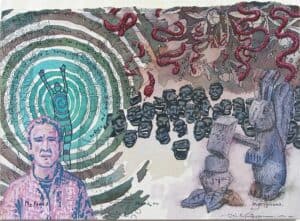 The 12 people who took part in Oriented to Love defied simple description, and our conversation gave me a taste of the astounding complexity behind our sexuality. I learned about gay and lesbian people who, while fully owning their orientation, have chosen celibacy because of a deep fealty to their faith tradition. I learned about gay people who, out of a deep and undeniable love, married their closest friends—of the opposite sex. I heard how our culture has so corrupted our view of sexuality that we have no idea how to touch one another in a physical yet asexual way—to “greet one another with a holy kiss”—no matter how much we crave it. I learned more about the definition of “queer” and about what lies at the core of the argument that marriage should be between one man and one woman.
The 12 people who took part in Oriented to Love defied simple description, and our conversation gave me a taste of the astounding complexity behind our sexuality. I learned about gay and lesbian people who, while fully owning their orientation, have chosen celibacy because of a deep fealty to their faith tradition. I learned about gay people who, out of a deep and undeniable love, married their closest friends—of the opposite sex. I heard how our culture has so corrupted our view of sexuality that we have no idea how to touch one another in a physical yet asexual way—to “greet one another with a holy kiss”—no matter how much we crave it. I learned more about the definition of “queer” and about what lies at the core of the argument that marriage should be between one man and one woman.
The twist, for me, was that all the people who taught me these things are striving to live faithfully to the call of Christ.
It’s tempting to scramble for a logical resolution to such a paradox—to filter all the words and perspectives and proceed efficiently to an opinion. I would submit that a great deal of what passes for dialogue on this issue has done precisely that. Hence people are quick to conclude that those on the other side are “rationalizing their lifestyle” or “trying to get with the times” or “hiding behind the Bible to avoid change” or simply “pushing their political agenda.”
Yes, there are people who do these things, but my 11 companions in this dialogue were not among them. We did not seek a logical solution but rather lived with the paradox. While sharing our personal stories of sexuality and gender with one another, we also explored thoughts I have rarely, if ever, heard in this context: our stubborn desire for reductive simplicity in the face of such disconcerting complexity, the value of surrendering our vision of what wholeness looks like, the daunting task of living authentically when social systems favor people who are not you, the need for the church’s repentance of the way it has treated LGBTQ people.
What if we all started living with the paradox for a while—the paradox of people with myriad different practices and viewpoints living faithfully in the midst of them? Out of these paradoxes, new questions often emerge. Here are a few that have emerged for me since the dialogue:
How many orientations are there? Can they change over time?
How many ways are there to live out each orientation—sexual or gender vocations, as it were?
Can we affirm every one of these vocations as a gift from God? If not, why not?
Why do we resist complexity? Is it because a simple one-size-fits-all answer actually exists, or because accepting the complexity requires us to keep our hearts stretched too large?
What if the Christian church threw open its doors to all people, asking only that they be faithful to the call of Christ in their lives?
Why do we feel the need to reconcile opposing views?
How do we live in community with one another—perhaps the most compelling imperative of the Christian faith—when we hold radically different beliefs about the way to be in the world?
Is dogma important? Is authority important? Why or why not?
At one point during Oriented to Love, a fellow participant—who knew about my background in advertising—asked me what I’d write as a headline to describe the dialogue. While he meant the question as a joke, it got me thinking. And what I came up with was this: Stop defining. Start listening.
I invite you, the reader, to grapple with the questions above, or raise your own. I ask only that you avoid being simplistic. Live with the paradox and speak out of it. Maybe we can break new ground in hearing one another—as Oriented to Love did in such an extraordinary way.
John Backman is the author of Why Can’t We Talk? Christian Wisdom on Dialogue as a Habit of the Heart (SkyLight Paths, 2013). He blogs regularly for Huffington Post Religion, serves on the board of the National Coalition for Dialogue & Deliberation, maintains his own site at DialogueVenture.com, and is an associate of an Episcopal monastery in upstate New York, where he lives with his wife of more than three decades.


